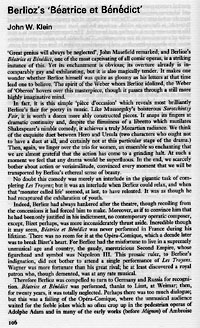
Berlioz’s ‘Béatrice et Bénédict’
by
John W. Klein
© 1969-2011 John W. Klein
Published in

 |
Berlioz’s ‘Béatrice et Bénédict’by John W. Klein © 1969-2011 John W. Klein Published in |
 |
‘Great genius will always be neglected’, John Masefield remarked; and Berlioz’s Béatrice et Bénédict, one of the most captivating of all comic operas, is a striking instance of this. Yet its enchantment is obvious; its overture already is incomparably gay and exhilarating, but it is also magically tender. It makes one wonder whether Berlioz himself was quite as gloomy as his letters at that time lead one to believe. The spirit of the Weber whom Berlioz idolized, the Weber of ‘Oberon’ hovers over this masterpiece, though it passes through a still more highly imaginative mind.
In fact, it is this simple ‘pièce d’occasion’ which reveals most brilliantly Berlioz’s flair for poetry in music. Like Mussorgsky’s boisterous Sorochintsy Fair, it is worth a dozen more ably constructed pieces. It snaps its fingers at dramatic continuity and, despite the flimsiness of a libretto which mutilates Shakespeare’s nimble comedy, it achieves a truly Mozartian radiance. We think of the exquisite duet between Hero and Ursula (two characters who ought not to have a duet at all, and certainly not at this particular stage of the drama.) Then, again, we linger over the trio for women, an ensemble so enchanting that we are almost grateful that the action has come to a grinding halt. At such a moment we feel that any drama would be superfluous. In the end, we scarcely bother about action or verisimilitude, convinced every moment that we will be transported by Berlioz’s ethereal sense of beauty.
No doubt this comedy was merely an interlude in the gigantic task of completing Les Troyens; but it was an interlude when Berlioz could relax, and when that ‘monster called life’ seemed, at last, to have relented. It was as though he had recaptured the exhilaration of youth.
Indeed, Berlioz had always hankered after the theatre, though recoiling from the concessions it had forced him to make. Moreover, as if to convince him that he had been only justified in his indictment, no contemporary operatic composer, except Bizet perhaps, was more inconsiderately thrust aside. Incredible though it may seem, Béatrice et Bénédict was never performed in France during his lifetime. There was no room for it at the Opéra-Comique, which a decade later was to break Bizet’s heart. For Berlioz had the misfortune to live in a supremely unmusical age and country, the gaudy, meretricious Second Empire, whose figurehead and symbol was Napoleon III. This prosaic ruler, to Berlioz’s indignation, did not bother to attend a single performance of Les Troyens. Wagner was more fortunate than his great rival; he at least discovered a royal patron who, though demented, was at any rate musical.
Therefore Berlioz was compelled to turn to Germany and Russia for recognition. Béatrice et Bénédict was performed, thanks to Liszt2, at Weimar; then, for twenty years, it was totally neglected. Perhaps there was too much dialogue; but this was a failing of the Opéra-Comique, where the unmusical audience waited for the feeble jokes which so often crop up in the pedestrian operas of Adolphe Adam and in many of the early works (before Mignon) of Ambroise Thomas. In Béatrice Berlioz was also forced to make the most far-reaching concessions of his life: he even introduced the coloratura aria he himself had stigmatized as the very negation of both music and drama. How often had he denounced this sort of thing, not only in Mozart and Bellini, but also in the operas of his friend and benefactor, Meyerbeer!
No doubt he would have excused himself by saying that such vocal acrobatics were sometimes forgivable in a vivacious comedy like Béatrice et Bénédict, but incongruous in tragic work such as Norma or Le Prophète. Then he would have added proudly: ‘In Les Troyens I swept aside all such excrescences, for they would have degraded my sublime tragedy; no Cassandra or Dido would ever have stooped to so ostentatious a vocal display. But Beatrice possesses all the exuberance of youth and wit, she might condescend to such a dazzling artifice without forfeiting one iota of her charm.’ Indeed, there is some truth in this, for who could find fault with Béatrice, whose famous aria, despite its flamboyant climax, is one of the loveliest things in music?
During those last gloomy years Berlioz’s many-sidedness
remains astounding: how else could he have passed so easily from tragedy to
comedy? For, despite some surprising similarities, Les Troyens and Béatrice
seem, on the whole, the works of two entirely different men. They remind one of Otello
and Falstaff; but even more of Shakespeare. Nevertheless, the creator
of King Lear and Much Ado About Nothing, whom Berlioz, like Verdi,
revered as ‘the greatest of all artists’, was scarcely more versatile than
the composer of both the sombre Trojan epic and one of the nimblest, most
enchanting, of gay burlesques. In both there is consummate ability to erect
unforgettably grim, implacable tragedy, and also improvised, heart-easing
comedy. And yet, the prejudice persists that Berlioz lacked humour. His letters
and articles sparkle with ironic wit, and so give the lie to such a superficial
view. Occasionally, perhaps, his humour may strike one as somewhat laboured but,
after all, so may Shakespeare’s. They possessed another characteristic in
common; unlike Mozart, both are at their most compelling in tragedy. For both,
as the years passed, life grew steadily more grim. What a miracle that exquisite
flowers like Béatrice and Miranda should have blossomed in such bewitching
profusion. But, then, is not supreme genius supremely unpredictable?
… Vous me demandez comment il se fait que vous ignoriez l’existence de cet opéra en deux actes que nous allons donner à Bade. C’est qu’il y a bien longtemps que je ne vous ai pas écrit. J’ai pris pour texte une partie de la tragi-comédie de Shakespeare (Much ado about nothing) et les idées musicales sont venues à la file, mais à longs intervalles, à cause toujours de mon infernale névralgie. Ces intervalles d’inaction forcée ont été si fréquents et si longs que, lors des premières répétitions, j’ai fait en quelque sorte connaissance avec ma musique dont je n’avais plus le moindre souvenir. Cela réussit beaucoup, et il paraît que mes deux héros Béatrice et Bénédict se raillent et se mordillent avec grâce. J’ai ajouté à la donnée shakespearienne une caricature musicale, un maître de chapelle grotesque nommé Somarone (gros âne) dont les âneries provoquent le rire.
(Letter to Princess Sayn-Wittgenstein, 22 July 1862,
now in the National Library of Scotland Collection [CG
no. 2634]).
![]()
See also on this site:
Berlioz in Baden-Baden, where Béatrice et Bénédict was premiered in August 1862.
![]()
1. We have transcribed the text of the article from the ADAM International Review, 1969, nos. 331-333, a copy of which is in our collection. We have not been able to contact the author or the editor of ADAM International Review, which has ceased publication.![]()
2. [Incorrect, and probably a confusion with Benvenuto
Cellini; by 1863, when Béatrice et Bénédict was performed in Weimar, Liszt was no longer there and had nothing to do with the performance. MA & MT]![]()
![]()
The Hector Berlioz Website was created by Monir Tayeb and Michel Austin on 18 July 1997; this page created on 11 December 2011.
© Monir Tayeb and Michel Austin. All rights of reproduction reserved.
![]() Back to Original Contributions page
Back to Original Contributions page
![]() Back to Home Page
Back to Home Page
![]() Retour à la page Contributions Originales
Retour à la page Contributions Originales
![]() Retour à la Page d’accueil
Retour à la Page d’accueil